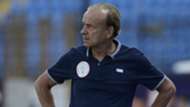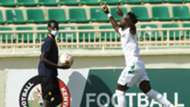With pretty much Nigeria's entire midfield based in the English top flight, coach Gernot Rohr will need to think out of the box to plug the gaps
Tuesday’s announcement of the decision by Premier League clubs to decline to release players for the September international window to countries on the UK’s red list has sent shockwaves all around the world of football.
While a statement on Wednesday by Fifa President Gianni Infantino called “on a show of solidarity from every member association, every league and every club, to do what is both right and fair for the global game” and revealed overtures have been made to the British Prime Minister for a relaxing of travel regulations, it is unclear whether this fire brigade response will bear fruit.
As it stands, all affected countries must begin to make alternative arrangements.
Nowhere will the effect be felt more keenly than in Africa, which has more representatives in the Premier League of any continent outside of Europe; and as much as South America and Asia combined, which (along with Africa) have the largest concentration of red list countries.
Nigeria, which accounts for the largest percent of the continent’s contingent, is not itself on the red list.

So, while it may in theory be able to get players released for the September 3 World Cup qualifier against Liberia in Lagos (the guidelines for action differ for the fully vaccinated and the unvaccinated, although there is an exemption for sportspeople who stay within a bubble), the trip to Cape Verde four days after will no doubt see the Super Eagles shorn of some of its more established and recognizable stars.
There is an added layer of difficulty, however, to the fact that most of those absentees play in the same zone on the pitch.
Wilfred Ndidi, Oghenekaro Etebo and Alex Iwobi have, for the better part of four years, been Nigeria’s starting midfield trio, and Frank Onyeka, who made his international debut in 2019, would have provided crucial depth.
It is unclear at this time whether the Scottish Premier League will toe the same line; if so, Joe Aribo could also miss out. With all the starting and depth options in midfield missing, there is some outside-the-box thinking required for Super Eagles coach Gernot Rohr.

Nowhere is this dire situation replicated.
Vice-captain William Troost-Ekong is a big miss, but his absence would hardly be terminal with Chidozie Awaziem waiting in the wings; Kelechi Iheanacho has only just regained prominence with the national team; and Emmanuel Dennis would likely not have gotten into the team anyway, being still in the process of reviving a career that seemed headed for the ‘wasted potential’ heap.
In midfield, however, potential replacements are less obvious.
Beyond resident squad factotum Abdullahi Shehu, who may finally get to play in his natural position, the pickings are slim.
Not even a look at some of the other midfielders Rohr has capped in his time at the helm offers much.

Ramon Azeez has yet to feature in any capacity for Granada this season, having spent the latter half of the 2020/21 season on loan at Cartagena. Ogenyi Onazi has not featured at international level for Nigeria since 2018, and last played in Lithuania for Zalgiris. (He joined Turkish Super Lig club Denizlispor a few days ago).
Despite playing regularly for Serie A newboys Salernitana, Joel Obi has been persona non grata since 2018 as well.
It may be necessary then to cast the net wider.
This could take in some more fringe options, especially former youth internationals who have yet to make the jump to the Super Eagles.
The likes of Kelechi Nwakali will, naturally, come to mind. Volatile and mercurial as he may be, the former under-17 star remains a gifted footballer, and seems to be working out his kinks in Segunda Division with Huesca.

So far this term, he has started both league matches for Marcos Espinoza’s side, and may be the biggest beneficiary of this most recent uncertainty. Bologna’s Kingsley Michael, a teammate of Nwakali’s at youth level, is another who may be considered.
Malmo’s Innocent Bonke has been crucial in his side’s advancement to the Uefa Champions League Group Stage, and former Manchester United youth prospect Tosin Kehinde has been in fine form with Danish club Randers.
Both offer something fresh and unseen, having not represented Nigeria previously at any level.
Interesting options though these are, there is cause for concern in the simple fact of timing and stakes.
While Rohr is expected to have the measure of a group containing Liberia, Cape Verde and the Central African Republic, having so many inexperienced players making their debuts is far from ideal.

It is the obverse of the optimum method for blooding and integrating young talent, and worse still it may put Nigeria on the back foot immediately.
Praia is a difficult away trip at the best of times for most teams in Africa.
These lads, expected to sink or swim, could end up washed out in embarrassing circumstances.
Having elected not to freshen up his options during the most recent international window for the pair of friendlies against Cameroon, Rohr can however have few excuses.
The circumstances may have been difficult to predict, but ultimately the German will need to face up to the consequences of his decisions if Nigeria is to get off to the strongest possible start in World Cup qualifying.










